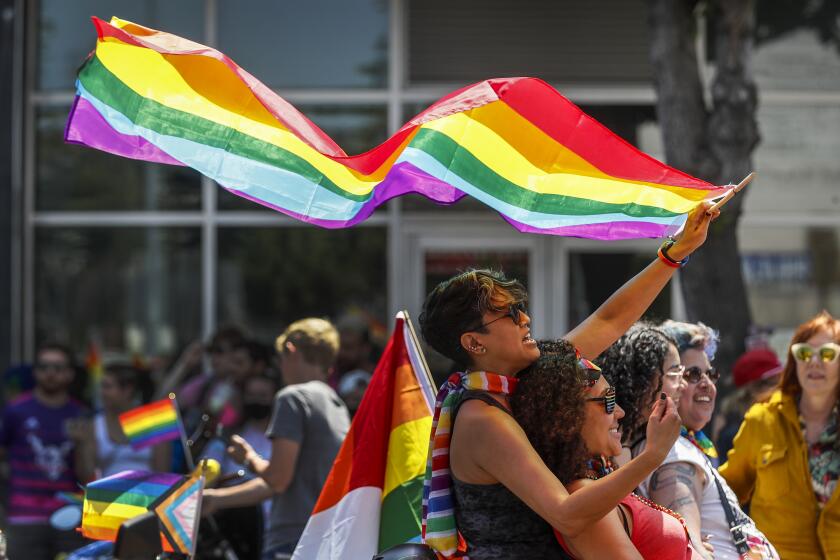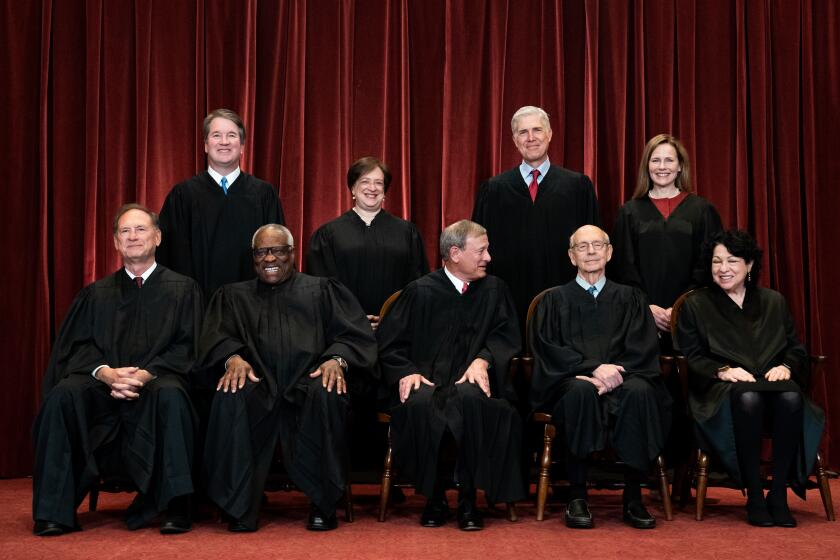Op-Ed: Clarence Thomas earns our scorn

- Share via
Thirty-one years after his confirmation to the Supreme Court, Justice Clarence Thomas is having his moment.
It’s been a long time coming. For most of those three decades, the ultra-conservative jurist stood in the shadows, on the sidelines, largely silent. He wrote little in the way of opinions and said less. In photos he always looked unhappy and uncomfortable, as if acutely aware of what critics thought of him, especially the many Black people who saw him as an entirely unworthy replacement for the first Black justice, civil rights hero Thurgood Marshall.
Of course, it was President George H.W. Bush’s cynical racial calculation that put Thomas on the court — trying to appeal to harder-edged conservatives while appearing progressive — but it is Thomas who has long borne the brunt of our scorn.
He’s earned it. As low-key as he’s been, Thomas has nonetheless carried water for the far right, which has been exponentially emboldened by the Trump presidency and the rapid transformation of the GOP into a fact-denying cult with little use for sound reasoning, legal or otherwise.
Overturning Roe vs. Wade was a big step. But Justice Clarence Thomas would go even further on contraception, gay sex and marriage equality.
But it has always had a use for Thomas.
Now, at last, he commands attention. His concurring opinion in the court’s decision to overturn Roe vs. Wade doesn’t just concur, it urges the right wing toward more fascism, more undoing of rights not explicitly articulated in the 14th Amendment, rights Thomas believes are not protected by “substantive due process.” Unlike his fellow conservative jurists, Thomas is taking a certain relish in kicking over cans, a triumphalism that feels downright Trumpian.
But the most galling thing is that Thomas’ prominence is made possible by another Black man: President Obama.
That might sound improbable. In the public sphere, Obama and Thomas barely exist in the same conversations. They are political opposites: Obama, the liberal, is the inheritor of the civil rights movement that culminated in the 1960s — the so-called Joshua generation — while the older Thomas joined a small cadre of Black conservatives who in the 1990s became darlings of the white right. (It must be said that Thomas is more extreme than most of those conservatives, and as a Supreme Court justice with a job for life, he wields the most power.)
Yet these two very different Black men have leading roles in the sordid narrative of the right wing’s attempt to take over American politics by any means necessary.
Let’s review: Obama’s election in 2008 jump-started a reactionary movement that found in the first Black president justification for a kind of overt racism that had long dwelt in the margins. Obama-hating to a large degree birthed the tea party, which in turn stoked an intense new hatred for the federal government Obama headed as president.
Who was Obama, and how will he be remembered?
This hyper-resentment on the right virtually ensured a broken Congress because to cooperate with even moderate Democrats was to cooperate with an illegitimate Black leader. Bipartisan lawmaking and the goal of serving a single American public became not things to strive for, but things to campaign against. This take-no-prisoners attitude infected electoral politics and other public institutions, including the Supreme Court. And here we are.
It’s worth noting that the backlash against Obama’s ascent was accompanied by an increase in white violence, represented by gun and bullet sales that exploded in 2008. Those sales have never abated. Ryan Busse, the former gun company executive who wrote an expose of the industry last year, called Obama’s election the gift to gun advocates that has kept on giving. The right’s slavish defense of gun rights, even in the midst of mass shootings, led to the Supreme Court’s recent ruling overturning New York’s 100-year-old concealed-carry law. Call it Thomas’ warm-up act.
The contrast between Obama and Thomas is so much greater than the usual policy differences between liberal and conservative. As president, Obama repeatedly called for a more perfect union; Thomas thinks the nation was perfect at its founding, despite the fact the Constitution he reveres accommodated slavery and the dispossession of native people, and excluded women and the non-landowning.
The Supreme Court’s most liberal justice says the court’s most conservative justice is kind and thoughtful and a friend. Progressive Twitter is highly unimpressed.
It’s one thing to be a Black conservative who touts self-reliance and thinks evidence for systematic racism is overblown — that’s embracing a certain ahistoricism embedded in the broader American culture. Deplorable, but understandable. But to be a Black “originalist” Supreme Court judge who believes he must adhere to a document that was designed to exclude and dehumanize people like him is just surreal.
That’s not about conservatism, it’s about defying reality because you can. It’s about indulging in the worst kind of American arrogance, the kind Black people are almost never in the position to exercise, not that we want to. Thomas is making the most of the opportunity.
All of us in this country will suffer the effects of the Trump court’s arrogance — indeed, we’ve been suffering them for a while. Thomas’ career authoritarianism, fully unleashed in the Roe reversal, is just one more outrageous moment in a flood of outrageous, unsavory moments that is the modern story of the right.
The cold comfort is that Thomas clearly belongs to that story, not to the story of Black struggle and progress that is so central to the full realization of a democratic America.
In all the chaos and uncertainty, that remains something to celebrate. Happy Fourth of July.
Erin Aubry Kaplan is a contributing writer to Opinion.
More to Read
A cure for the common opinion
Get thought-provoking perspectives with our weekly newsletter.
You may occasionally receive promotional content from the Los Angeles Times.













